
-
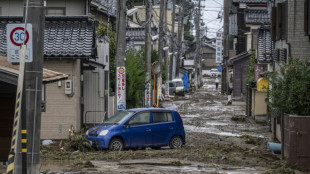 Six dead after floods in central Japan: media
Six dead after floods in central Japan: media
-
Australian golf prodigy suffers career-threatening eye injury

-
 Gaza hospital a symbol of the ruin of war
Gaza hospital a symbol of the ruin of war
-
October 7: how Israel's deadliest day unfolded

-
 Bibles, sneakers, silver coins: Trump's merch for sale
Bibles, sneakers, silver coins: Trump's merch for sale
-
Met Opera opens season with tech-heavy 'Grounded'
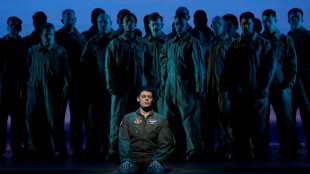
-
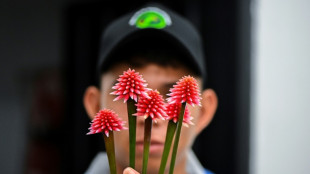 Colombia's Inirida flower: from 'weed' to emblem for UN meeting
Colombia's Inirida flower: from 'weed' to emblem for UN meeting
-
Colombia rebel group imposes control in restive coca zone

-
 Rams fight back to upset 49ers, Cowboys lose again
Rams fight back to upset 49ers, Cowboys lose again
-
Sri Lankan leftist leader to take office after landslide election win

-
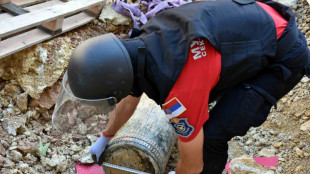 300-kilo WWI bomb removed in Belgrade
300-kilo WWI bomb removed in Belgrade
-
Zelensky in US to explain war plan to Biden, Harris, Trump

-
 'Atrocious' Sudan war pushing refugees further afield: UNHCR chief
'Atrocious' Sudan war pushing refugees further afield: UNHCR chief
-
'Convergence' growing on global plastics treaty: UN environment chief

-
 MLB White Sox fall to Padres to match one-season loss mark
MLB White Sox fall to Padres to match one-season loss mark
-
All-Australian Ripper squad captures LIV Golf team crown

-
 Barnier promises compromise from France's embattled new govt
Barnier promises compromise from France's embattled new govt
-
Zelensky arrives in US to explain war plan to Biden

-
 Barca rout Villarreal but Ter Stegen hurt, Atletico draw at Rayo
Barca rout Villarreal but Ter Stegen hurt, Atletico draw at Rayo
-
Darnold shines for Vikings, Steelers and Eagles win

-
 Atletico held to draw at Rayo Vallecano
Atletico held to draw at Rayo Vallecano
-
Marseille stun Lyon with 95th-minute winner after early red card

-
 Gabbia ends AC Milan's derby pain with late winner against Inter
Gabbia ends AC Milan's derby pain with late winner against Inter
-
Surging Ko claims LPGA Queen City crown in spectacular style

-
 'Impossible': Alcaraz shoots down Federer comparisons after Laver Cup win
'Impossible': Alcaraz shoots down Federer comparisons after Laver Cup win
-
Scholz's party beats far-right AfD in east German state vote

-
 Verstappen says 'silly' swearing row could hasten F1 exit
Verstappen says 'silly' swearing row could hasten F1 exit
-
Calls for Israel and Hezbollah to step back from the abyss

-
 Israel and Hezbollah urged to avoid 'catastrophe'
Israel and Hezbollah urged to avoid 'catastrophe'
-
Colombia battles fires as drought fuels Latin American flames
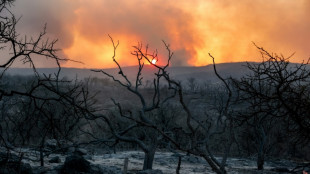
-
 Pressure piles on new French government from day one
Pressure piles on new French government from day one
-
Arteta proud as Arsenal salvage point from 'impossible' task

-
 Barca rout Villarreal in thriller but Ter Stegen hurt
Barca rout Villarreal in thriller but Ter Stegen hurt
-
Roma stroll past Udinese as fans protest De Rossi sacking

-
 Horschel outduels McIlroy to win PGA Championship play-off
Horschel outduels McIlroy to win PGA Championship play-off
-
Audiences summon 'Beetlejuice' to top of N. America box office for third week

-
 Stones salvages point for Man City against 10-man Arsenal
Stones salvages point for Man City against 10-man Arsenal
-
Egypt fears 'all out' regional war: foreign minister to AFP

-
 Last-gasp Boniface gives Leverkusen victory, Stuttgart outclass Dortmund
Last-gasp Boniface gives Leverkusen victory, Stuttgart outclass Dortmund
-
Scholz's party beats far-right AfD in east German state vote: projections

-
 Olympic champion Evenepoel retains world title in 'toughest time trial'
Olympic champion Evenepoel retains world title in 'toughest time trial'
-
Horschel's eagle beats McIlroy in PGA Championship play-off

-
 Mourners at commander's funeral express loyalty to Hezbollah
Mourners at commander's funeral express loyalty to Hezbollah
-
Norris hails his 'mega' McLaren after dominant win at Singapore

-
 Monaco beat Le Havre to join PSG at the top of Ligue 1
Monaco beat Le Havre to join PSG at the top of Ligue 1
-
Scholz's party narrowly leads far-right AfD in east German state vote: exit polls

-
 New leftist president vows to 'rewrite Sri Lankan history'
New leftist president vows to 'rewrite Sri Lankan history'
-
UN adopts pact to tackle volatile future for mankind

-
 Leclerc hails Ferrari fightback from torrid Singapore GP qualifying
Leclerc hails Ferrari fightback from torrid Singapore GP qualifying
-
Belgian Evenepoel retains world title in 'toughest time trial'


In Bashtanka, Russian forces sow destruction and despair
Vitaly's little orange car -- "CHILDREN" written in Russian on signs stuck to the windows and windscreen -- broke down outside the war-scarred town of Bashtanka in southern Ukraine.
The town had been torn apart in the month of fierce fighting since Russia invaded Ukraine.
Kyiv's forces were still in control there, but for Vitali and his family, the fighting was still too close for comfort. So they were heading north, he told AFP.
Vitaly, his wife, two children and his mother-in-law had fled the Russian-controlled town of Snihurivka about 60 kilometres (37 miles) east of Mykolaiv, a key coastal city for the Russian forces.
The bombardments there were incessant, he said. "At first it was on the outskirts and now in the centre."
"There's been no water or electricity for 10 days," he said. "People there have started looting.
"The most important thing now is to survive. We've left everything behind."
Despite the icy wind blowing over the plain, he was dressed in a baseball cap and flip-flops, a testament to their hurried departure.
Before their car gave out outside Bashtanka, they had been heading towards Zhytomyr, a town in the centre of the country and west of the capital where they have family.
Eventually they found a way out of the battle zone, leaving the carcasses of burnt-out cars behind them.
- 'No forgiveness' -
Before the war, Bashtanka had a population of around 12,000 people. During Soviet times, it was known as a regional tractor depot.
Now, the city emptied of civilians, it is populated mainly by Ukrainian soldiers.
In the centre, a mural of a smiling cosmonaut still adorns the blackened facade of a building damaged by shelling. It escaped the blast that destroyed part of the ground-floor pharmacy and the building's roof.
But Sergei, a 43-year-old resident who told AFP he had taken part in the fighting there, remained defiant. "We gave these fascists the lesson they deserved," he said.
For a couple of days earlier this month, Russian troops won partial control of the town before Ukrainian troops forced them back out, officials and residents said.
"They took villages around Bashtanka and looted them," said Natasha Gasilina, a middle-aged lady wearing a thick burgundy coat.
In one village the Russian soldiers found photos of members of the Ukrainian forces fighting pro-Kremlin separatists in the east of the country since 2014, she told AFP.
"They looked for them to kill them," she said -- but in vain.
The war came to Bashtanka on March 13, when the city was woken by Russian bombs -- dropped by parachute, say residents -- that left large craters and shook the nearby homes.
Only one injury was reported: a man pulled out alive from under the rubble.
"There were Ukrainian military vehicles there, but they missed them," said one young man, who declined to give his name. But the roof of his parents' home several hundred metres away had been ripped off by the force of the blasts.
Olga Miheikina arrived by bicycle from another neighbourhood to ask after a family friend and survey the damage.
"It's inhuman," she said at the sight of the destruction. "These people who call themselves our brothers, who lie to the whole world and to their own people."
"There'll be no forgiveness nor divine mercy for such people!"
Nearby, 82-year-old Anatoly, dressed in blue overalls and a cap, stood outside what was left of his home: the roof gone, the windows blown out. He had sent his wife away to stay to with friends.
"Before all of this, I wanted to live to be a hundred years old," said the frail old man.
"Not anymore."
C.Meier--BTB
